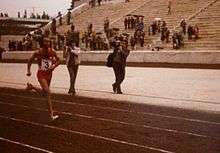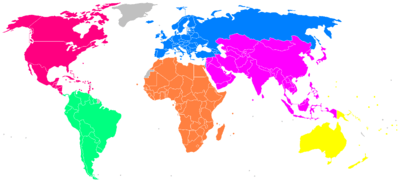IAAF Golden Events
The IAAF Golden Events were a sporadic series of twelve athletics events organised by the International Amateur Athletics Federation (IAAF) from 1978 to 1982. Aside from the inaugural event in Tokyo, the contests were held in Europe and were attached to independent track and field meetings.[1] The purpose of the events was to raise the profile of the sport outside of Olympic competition. Marking the growing professionalism in athletics, a significant prize pot was given to the winner of the event – a move designed to attract the sport's top athletes to compete against each other at the same meeting. The inaugural prize was an 18-carat gold trophy worth 9,500 US dollars.[2] All twelve events were for men, reflecting their position as the most prominent sex during that period.[1]

The central element of the series was the Golden Mile – a men's mile run contest that launched the series in 1978 and was held annually until 1981. The rivalry of British runners Steve Ovett and Sebastian Coe in this event saw each take two wins and Coe set two mile world records in the process.[3][4] British athletes were particularly successful in the series and won eight of the twelve events. A sprint format, aggregating an athlete's times in separate 100 metres and 200 metres, was launched in 1979 and repeated in 1981. Long-distance running was also a major element of the series as it featured one 5000 metres race, two 10,000 metres races,[5] and a marathon race over the series history. Field events were in a minority, with one javelin throw and one pole vault being their only appearance.[6][7] The marathon, in 1982, was the last Golden Event to be held.[1][8]
The establishment of the IAAF World Championships in Athletics in 1983 saw the IAAF focus on its sport-specific championships as a way of using prizes to generate top level competition.[9] The launch of the IAAF Grand Prix in 1985 formalised the major track and field circuit as a professional series of point-scoring events.[10] The "Golden" was idea revived in the form of the Golden Four in 1992 – a high-prize money, track and field series comprising Oslo, Zurich, Brussels and Berlin (all venues that had hosted Golden Events).[11] This was later expanded and co-opted by the IAAF in 1998 as the IAAF Golden League,[12] which was itself later expanded to the current major track and field series: the IAAF Diamond League.[13]
Some of the events featured title sponsors: the first event was also known as the "Dubai Golden Mile", given its sponsorship by the emirate, and the final event was also known as the "Citizen Golden Marathon", under the patronage of Japanese watchmakers Citizen Holdings.[4][14]
Editions
| Year | Event | Location | Meet | Winner |
|---|---|---|---|---|
| 1978 | Mile run | Tokyo, Japan | Tokyo Eight Nations International | Steve Ovett |
| 1979 | 100/200 metres | Zürich, Switzerland | Weltklasse Zürich | James Sanford |
| Mile run | Oslo, Norway | Bislett Games | Sebastian Coe | |
| 10,000 metres | Brussels, Belgium | Memorial Van Damme | Mike McLeod | |
| Javelin throw | Budapest, Hungary | Arto Härkönen | ||
| 1980 | Mile run | London, United Kingdom | London Grand Prix | Steve Ovett |
| Pole vault | Nice, France | Serge Ferreira | ||
| 1981 | 100/200 metres | Berlin, West Germany | Internationales Stadionfest | Allan Wells |
| Mile run | Brussels, Belgium | Memorial Van Damme | Sebastian Coe | |
| 5000 metres | Gateshead, United Kingdom | British Grand Prix | Barry Smith | |
| 10,000 metres | Prague, Czechoslovakia | Mike McLeod | ||
| 1982 | Marathon | Athens, Greece | n/a | Rodolfo Gómez |
Podium finishers
| Event | First | Second | Third | |||
|---|---|---|---|---|---|---|
| 1978 Golden Mile | 3:55.5 | 3:57.3 | 3:59.2 | |||
| 1979 Golden Sprints | 30.54 | 30.64 | 30.67 | |||
| 1979 Golden Mile | 3:48.95 WR | 3:51.11 | 3:52.02 | |||
| 1979 Golden 10,000 m | 27:39.76 | 27:41.23 | 27:41.34 | |||
| 1979 Golden Javelin | 90.18 | 89.40 | 85.38 | |||
| 1980 Golden Mile | 3:52.84 | 3:52.92 | 3:53.19 | |||
| 1980 Golden Vault | 5.70 m | 5.60 m | 5.60 m | |||
| 1981 Golden Sprints | 30.30 | 30.86 | 30.97 | |||
| 1981 Golden Mile | 3:47.33 WR | 3:49.45 | 3:51.48 | |||
| 1981 Golden 5000 m | 13:21.14 | 13:23.95 | 13:24.66 | |||
| 1981 Golden 10,000 m | 27:59.38 | 27:59.43 | 27:59.68 | |||
| 1982 Golden Marathon | 2:11:49 | 2:13:34 | 2:14:07 | |||
References
- Golden Events. GBR Athletics. Retrieved on 2015-02-26.
- JAPAN: BRITAIN'S STEVE OVETT WINS THE GOLDEN MILE IN TOKYO, BUT HIS TIME IS WELL OUTSIDE JOHN WALKER'S WORLD RECORD.. ITN News/Reuters (1978-09-25). Retrieved on 2015-02-26.
- Ovett Cops Second Golden Mile Race. The Virgin Islands Daily News (1980-08-27). Retrieved on 2015-02-26.
- "Within the International Federations". Olympic Review (1980). Retrieved on 2015-02-26.
- Turnbull, Simon (2006-10-01). Athletics: McLeod: When we were the run kings. The Independent. Retrieved on 2015-02-26.
- Moore, Kenny (1984-07-18). The Latest In A Long Line. Sports Illustrated. Retrieved on 2015-02-26.
- Ferreira beats world's best vaulters. Straits Times (1980-08-19). Retrieved on 2015-02-26.
- Gomez Is First. New York Times (1982-03-08). Retrieved on 2015-02-26.
- Turrini, Joseph M. (2010). The End of Amateurism in American Track and Field, pg. 239. University of Illinois Press. ISBN 9780252077074. Retrieved on 2015-02-26.
- History of IAAF World Challenge Archived 2015-02-24 at the Wayback Machine. IAAF World Challenge. Retrieved on 2015-02-26.
- Athletics: 'Golden Four' raising the stakes: Jaackson and Powell share jackpot as organisers in London and Lausanne press to join the elite stakes. The Independent (1994-09-01). Retrieved on 2015-02-26.
- Rowbottom, Mike (1997-11-22). Athletics: Golden Four extended with more money and meetings . The Independent. Retrieved on 2015-02-26.
- Twelve years of the IAAF Golden League. IAAF (2009-09-09). Retrieved on 2015-02-26.
- Marathon History Lesson 5. Athens Marathon (2014-05-26). Retrieved on 2015-02-26.
- Podium finishers
- Golden Events. GBR Athletics. Retrieved on 2015-02-26.
